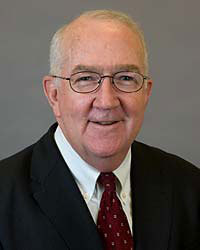
Ken Hackett, former president of Catholic Relief Services (CRS), will receive the University of Notre Dame’s 2012 Laetare Medal, the oldest and most prestigious honor given to American Catholics, at Notre Dame’s 167th University Commencement ceremony May 20 (Sunday).
“Ken Hackett has responded to a Gospel imperative with his entire career,” said Notre Dame’s president, Rev. John I. Jenkins, C.S.C. “His direction of the Catholic Church’s outreach to the hungry, thirsty, naked, sick and unsheltered of the world has blended administrative acumen with genuine compassion in a unique and exemplary way.”
A native of West Roxbury, Mass., Hackett graduated from Boston College in 1968, enrolling in the Peace Corps the same year because, as he has said, “it seemed like an interesting thing to do.”
Assigned to rural Ghana, living in a Catholic mission in the Volta Lake region and working in an agricultural cooperative project, Hackett underwent what he recently described as “my first experience in warehouse management” as well as of the “actual impact of American food aid on the health and well-being of very poor kids in a very isolated part of a West African country.”
The experiences were formative. Following his completion of his Peace Corps assignment, Hackett joined CRS in 1972, starting his career in Sierra Leone, where he managed both a nationwide leprosy control and a maternal and child health program. He has since served in CRS posts throughout Africa and Asia, as well as in administrative positions at the CRS Baltimore headquarters. As the CRS regional director for Africa, he managed the agency’s response to the Ethiopian famine of 1984-85. He also supervised CRS operations in East Africa during the 1990s crisis in Somalia.
Appointed president of CRS in 1993, Hackett served in that position for 18 years, retiring last December. He was succeeded as CRS president by Carolyn Woo, former dean of Notre Dame’s Mendoza College of Business.
During Hackett’s tenure as the sixth president of CRS, the agency redoubled its effort to engage the Catholic community of the United States in its worldwide work, by establishing a division that would focus on reaching out to dioceses, parishes, Catholic organizations, colleges and universities and for the first time adding lay people to its board of directors. Now among the world’s most effective and efficient relief and development agencies, it operates in more than 100 countries, with a global staff of nearly 5,000.
Former North America president of Caritas Internationalis, the confederation of humanitarian agencies of the Catholic Church, Hackett continues to serve on the board of the Vatican Pontifical Commission Cor Unum and as an adviser to the U.S. Conference of Catholic Bishops.
In addition to an honorary degree received from Notre Dame in 2007, he also holds honorary degrees from Boston College, Cabrini College, University of Great Falls, College of Notre Dame of Maryland, Mount St. Mary’s University, New York Medical College, Siena College, University of San Diego, Santa Clara University, Villanova University and Walsh University.
The Laetare (pronounced lay-TAH-ray) Medal is so named because its recipient is announced each year in celebration of Laetare Sunday, the fourth Sunday in Lent on the Church calendar. “Laetare,” the Latin word for “rejoice,” is the first word in the entrance antiphon of the Mass that Sunday, which ritually anticipates the celebration of Easter. The medal bears the Latin inscription “Magna est veritas et prevalebit” (“Truth is mighty, and it shall prevail”).
Established at Notre Dame in 1883, the Laetare Medal was conceived as an American counterpart of the Golden Rose, a papal honor which antedates the 11th century. The medal has been awarded annually at Notre Dame to a Catholic “whose genius has ennobled the arts and sciences, illustrated the ideals of the Church and enriched the heritage of humanity.”
Among the 135 previous recipients of the Laetare Medal are Civil War Gen. William Rosecrans, operatic tenor John McCormack, President John F. Kennedy, Catholic Worker foundress Dorothy Day, novelist Walker Percy, Cardinal Joseph Bernardin, labor activist Monsignor George G. Higgins, and jazz composer Dave Brubeck.